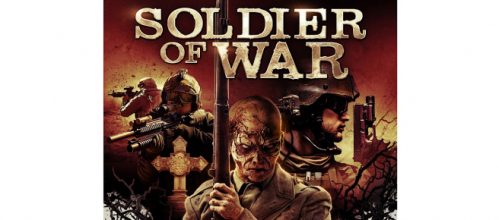London-based filmmaker John Adams got his start in the industry working with Steven Spielberg as a military consultant on the award-winning mini-series ‘’Band of Brothers’’ in the late ‘90s. Later, Adams started producing films himself, and after 70 films, decided he’d also try his hand at directing one of them. ‘’Soldier of War,’’ released in March, enabled Adams to combine his knowledge of the military with his vast and rich imagination.
John Adams recently discussed this film project and more via an exclusive interview.
Movies, films, and the UK
Meagan Meehan (MM): Where about in the UK are you?
John Adams (JA): Evolutionary Films is based at 3 Mills Studios in East London. 3 Mills has been a film and television studios since the 1980s and is the home of a number of world-renowned shows including “The Royals” starring Joan Collins, Liz Hurley and Vincent Regan as well as hosting a number of shoots for WWE Films, Danny Boyle such as “28 Weeks Later” and “Sunshine,” Wes Anderson’s “Fantastic Mr Fox” and “Isle of Dogs” and the permanent standing set for “UK Masterchef.”
MM: And you’ve always lived and work there?
JA: As a company we’ve been permanently based at 3 Mills Studios since 2015, but I personally have been filming movies there since 2011 and before that was based at Shepperton Studios for a number of years.
I actually live North East of London a 40-minute drive from the city, not far from the coast and the site of the Battle of Maldon in 991AD and the start of the Boudiccan Rebellion against the Roman Empire in 61AD.
MM: How long have you been making movies for and what did you do prior to that?
JA: Not quite that long! My first professional job in the film industry was as a military consultant to Steven Spielberg’s “Band of Brothers” in 1999. However, the first distributed film I produced was in 2008. Prior to working in the film industry, I was an Army Officer for six years and served all over the world as a Platoon Commander and Battalion Training Officer in a mechanised infantry unit. I also always had a creative streak and as early as 1996 I co-devised a play which was taken on tour around Western Australia.
MM: And where does “Soldier of War” rank; is this your most ambitious film?
JA: “Soldier of War” is my first film as director after over 70 credits as a producer, assistant director and military consultant. I think it was very important to draw on my military experience and make a film about a historical subject I’m comfortable with. It is very ambitious, especially considering the resources we were working with and I’m very proud of what we achieved.
I think that’s mostly about where my focus was. Previously as a producer, my attention has always been on the bigger picture – what are we doing tomorrow? How prepped is next week? But as my directorial debut, it was very important that during “Soldier of War” my attention and focus was entirely on the monitor and the creative vision of what we’re shooting right now!
I’m very grateful to have been surrounded by a production team, cast and crew who took all the pressure and doubt away from everything else and allowed me that focus.
MM: Was it hard to entice John Rhys-Davies into the movie?
JA: John Rhys-Davies is a passionate historian and his father was in a reserved occupation during WWII. From the moment he heard the concept of the film, he was on board with the idea of a ‘dead patriot’ and he has been a great supporter of the project.
Performances, artwork, and advice
MM: He has received a lot of praise for his performance, so ow much of his character was on paper?
JA: We had a number of long conversations (often several hours at a time) about the character of Jack before John arrived on location and he had a great deal of input into the character.
He is also a fantastic actor and once we had a take in the can, he would often ask if he could try alternative versions and deliveries which is an absolute privilege to witness as he brings a different reading or even changes the emotion of a moment.
MM: And for those who have seen the artwork and think they’re about to watch an out-and-out zombie film, what do you say?
JA: The artwork has been different in every country the film has released in and has varied from zombie film to slasher horror to psychological thriller depending on the sensibilities of the audience. I hope the film has enough elements of all of these to keep audiences satisfied, but it certainly doesn’t fit into any particular box and I’d also hope it keeps people guessing a bit about where it’s really going.
MM: So, John, where do you hope to be as a filmmaker in ten years?
JA: I love what I do at Evolutionary Films and we’re growing our UK distribution business now as well as producing film and TV ad handling international sales. I can’t imagine me ever doing anything else now so my main hope is that we can continue to drive up the value of what we’re doing and make and attract films with bigger budgets and even more saleable cast.
MM: Any sage advice for folks, especially in the UK, looking to get into filmmaking?
JA: I think the main advice would be to make sure your project is viable and has an audience, take advice on board when it is offered but also stick to your guns, persevere, work harder than anyone else and get yourself noticed!


